14
During the late 1920s, Acton became very involved in the marketing of milk produced in the Fraser Valley through the Milk Shippers Agency, an organization that operated in direct competition with the Fraser Valley Milk Producers Association. That agency operated until 1959, when changes in provincial regulations led to its closure. During that time, Jessie became the "resident manager" of the farm, store, post office, and family home. Many loyal and competent individuals assisted her with her numerous tasks, but it was her leadership that held things together.The post-World War II growth in community members becoming more mobile led to a decline in the store business. In addition, the 1948 flood and its aftermath made the farming situation extremely difficult. To counter these two money-losing situations, the herd was sold and the land rented or sold to local farmers. The store and post office remained in operation and Acton's motto, "You never know; someday, someone may want it," led to the store evolving from a quaint family museum into a popular tourist attraction.
15
Acton and Jessie Kilby - Interior of General Store20th Centruy, Circa 1960
Kilby Historic Site, Harrison Mills, British Columbia, Canada
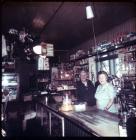 Credits:
Credits:Fraser Heritage Society
16
In 1960, the Kilby's donated ten acres of beach property to Kent municipality to be used as a park, which is now part of the Historic Site. In 1972 the provincial government and three regional districts purchased the store, the house, the land on which they sat, and seventeen acres adjacent to the beach. This purchase began the long process that ultimately led to the creation of Kilby Historical Store and Farm and Provincial Park.17
Acton and Jessie Kilby20th Century, Circa 1960
Kilby Historic Site, Harrison Mills, British Columbia, Canada
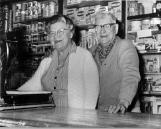 Credits:
Credits:Fraser Heriatge Society
18
While growing up, Peter Kilby remembers that his parents Acton and Jessie "had a real working partnership and they retained a strong and loving relationship until death parted them." Of his mother, he recalls that she was very caring, though she was quite a worrier. "I never had much trouble dealing with the more modern and liberated women, because my mum was one long before that status came into general use. I respected her because I recognized early on that she was the glue that kept things together and the oil that kept things running smoothly when my dad was away." Of his father Acton, Peter declares that "he was a good father who was kind, firm, loving, and a "no-nonsense" kind of parent." He also remembers his father liked to be busy doing things, and being involved in things like serving on the Municipal Council. What he remembers most about his father is that he really cared. "I remember how he helped people out when they came in to the store for supplies and how he helped out the local First Nations people. "He always had a sense of what was right and wrong in whatever he did" He also states: "Both my parents taught us the meaning of trust, expectations, taking care of others, and a strong work ethic."19
Acton Kilby with Butter Churn20th Century,
Kilby Historic Site, Harrison Mills, British Columbia, Canada
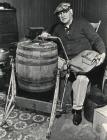 Credits:
Credits:Fraser Heritage Society
Courtesy Vancouver Sun Newspaper
20
In 1981, Acton Kilby Jr. wrote a story that described Christmas at the Kilby home: "Christmas was the time of the year when my father played his own unique role as the "Spirit of Christmas." He always spent weeks building up to the big event. Shopping took place over an extended period of time, and packages were brought home from his weekly trips to the city. The packages were taken to the top floor of the store to "THE LOCKED ROOM." This was a room that year round held special records, cabinets, and even a human skull. The lock itself was a very sturdy padlock that swung from the hasp and loomed large in the eyes of us children. As the boxes, bags, and other items in the locked room increased, so did the tension, enthusiasm, and expectations of the Kilby kids. Eventually time passed, and Christmas Eve was with us. Each year the Christmas tree was placed in the dining room and decorated on Christmas Eve. The final act before bed was to bring, from upstairs, the glass windowed dining room door that was never in place during the year. We would then put paper over the window and hang it in place. Each of the children placed the presents they were giving under the tree and left a treat for Santa. Then my sister, whose birthday fell on Christmas Day, got to lock the door. These activities were always supervised very thoroughly by both my parents, any visitors we may have had, and checked by each of the children not involved in turning the key.21
Christmas morning always brought with it a series of activities and frustrations that raised the anticipation level even higher than any young person thought possible. First, the beds had to be tidied while a breakfast of porridge to carry us though until dinner was prepared. The morning train had to be met, the mail bags exchanged, and their contents sorted. Finally, "THE DOOR" was unlocked and we beheld the tree and gifts while basking in the warmth of the "Magestic," our big, black, wood burning range. Then the family assembled and Dad took the packages off the tree, one at a time, and cut the string or ribbon with his pocket knife, and passed gifts to each of us in succession while Mother folded the paper and string for recycling. One of the things we all knew was that gifts "from Santa" were always wrapped in brown paper and tied with a loop of white cotton string. Gifts ranged from the practical to the frivolous, and we were always given a toy, even when we were young adults. In time we learned that Santa was father, and looking back on this, I remember so fondly the man who orchestrated this high adventure for the children he loved."22
Acton Kilby in Basement of General Store20th Century, Circa 1969
Kilby Historic Site, Harrison Mills, British Columbia, Canada
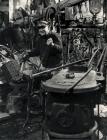 Credits:
Credits:Fraser Heritage Society
Courtesy Vancouver Sun Newspaper
23
Farm equipment and implements line the wall of the basement of the Kilby General Store.24
Acton Kilby in Dining Room behind General Store20th Century,
Kilby Historic Site, Harrison Mills, British Columbia, Canada
 Credits:
Credits:Fraser Heritage Society
Courtesy Vancouver Sun Newspaper
25
Acton and Jessie Kilby provided service in the post office for many years. "Going for the mail" was a routine daily activity for most residents of Harrison Mills. It afforded people with the opportunity to chat and catch up with all the news.26
Acton and Jessie Kilby in Post Office inside General Store20th Century, Circa 1968
Kilby Historic Site, Harrison Mills, British Columbia, Canada
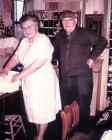 Credits:
Credits:Fraser Heritage Society